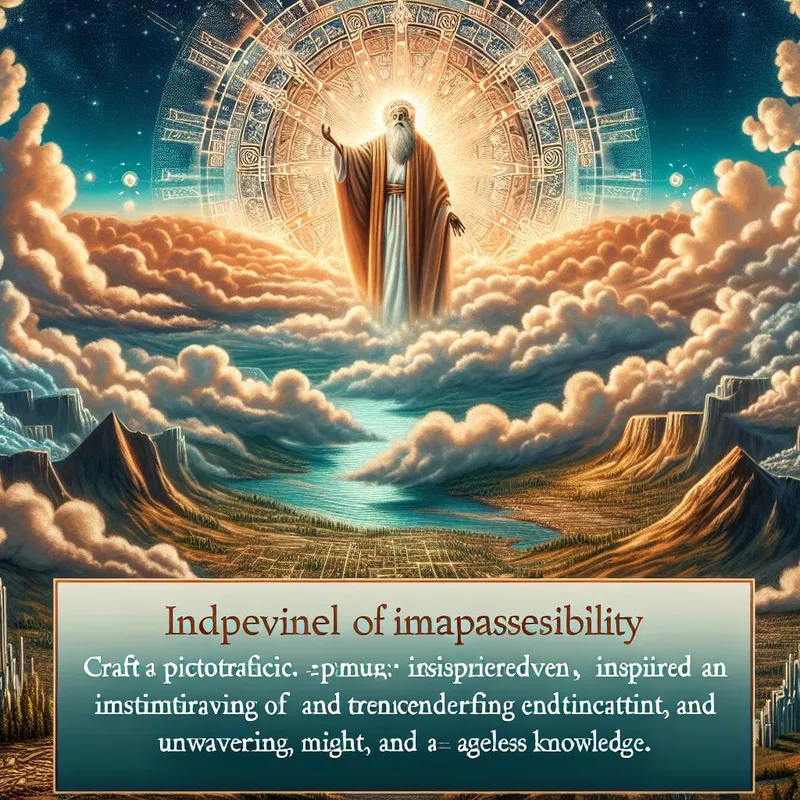
'Understanding Divine Impassibility: The Unchanging Nature of God'
Posted on 02 July 2024
Divine Impassibility: Understanding God's Unchanging Nature
Divine impassibility is a concept that explores the question of whether God experiences pain or emotions. This idea can be complex, as it is understood differently by different people. Some argue that the term should be replaced or not used at all. However, when we delve into the concept of divine impassibility, we find that it arises from the unchangeable nature of God, known as His immutability.
God's Unchangeable Nature
Immutability refers to God's unchanging nature. It suggests that God does not feel pain, sorrow, or any other emotions. Advocates of divine impassibility argue that if God could change, it would imply imperfection in His nature. They believe that passages in Scripture which depict God experiencing passion or pain are anthropomorphisms—figurative language used to describe God in human terms.
However, taking this belief to its logical conclusion might suggest that God is a static being, devoid of any action or movement. He would be like a statue, incapable of interaction or response. This extreme viewpoint fails to acknowledge that Scripture presents a more nuanced perspective on the matter.
The Middle Ground: Scripture's Perspective
Scripture seems to strike a middle ground between two opposing views—Open Theism and divine impassibility. Open Theists take the biblical words about God's emotions quite literally. They believe that God reacts genuinely to human choices with emotions such as disappointment or surprise. However, this perspective suggests that God does not possess foreknowledge of human decisions. Consequently, when He discovers these choices, He experiences genuine reactions.
In contrast, those who uphold divine impassibility argue against Open Theism because they believe it diminishes the perfection of God. They maintain that while God has emotions, He is not bound by them in the same way humans are. God's emotions are more than just anthropomorphic; they are real. However, His emotions do not cripple Him or cause Him to lose control.
God's Emotions and His Unchanging Nature
It is crucial to recognize that God's emotions do not compromise His unchanging nature. He can interact with changeable human beings and respond to our choices within the dimensions of time and space, even though He exists outside of them. While His character remains consistent, the way He responds to us may differ depending on the situation. His responses are always in harmony with His other attributes.
For example, God may grieve, but He is never overwhelmed by grief. He may be angry, but He does not lose His temper. And while He may be disappointed by our choices, these choices do not catch Him by surprise. In this way, we can understand God's immutability as an unchangeable nature that allows Him to experience pain and emotions without compromising His perfection.
Christ's Role in Understanding Divine Impassibility
In the person of Jesus Christ, God has experienced pain and suffering. This aspect of Christ's incarnation helps us comprehend how an unchangeable God can still experience emotions. The Bible tells us that Jesus grew, acted, had emotions, died, rose again, and expressed anger, compassion, and hunger. Yet despite these changes, it does not suggest that Jesus was anything less than perfect from the beginning.
Hebrews 13:8 states that "Jesus Christ is the same yesterday and today and forever." This verse highlights the consistency of Jesus' character throughout time. It implies that although Jesus underwent changes in His earthly life, these changes did not diminish His divine nature or perfection.
Why This Matters
Understanding divine impassibility is crucial for believers because it shapes our perspective on who God is and how He relates to us. Recognizing that God experiences emotions but remains unchanging assures us of His stability and faithfulness. We can trust that His responses to us are consistent with His unchanging character, even if they may vary according to the circumstances.
Furthermore, comprehending divine impassibility helps us avoid falling into the trap of thinking that God's emotions are like our own. We must not project our limitations and flaws onto God but rather recognize His perfect and unchanging nature.
Think About It
Consider how your understanding of God's emotions affects your relationship with Him. Do you find comfort in knowing that God does experience emotions but is not controlled by them? Reflect on how this knowledge can deepen your trust in His unchanging character and faithfulness. Take time to meditate on passages in Scripture that portray God's emotions, such as Jesus weeping at the tomb of Lazarus or expressing righteous anger in the temple.
